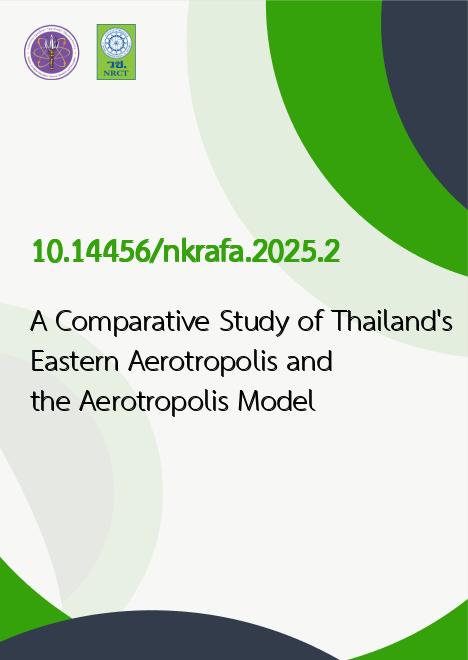
|
A Comparative Study of Thailand's Eastern Aerotropolis and the Aerotropolis Model |
|---|---|
| รหัสดีโอไอ | |
| Creator | Pensiri Laosu-angkoon |
| Title | A Comparative Study of Thailand's Eastern Aerotropolis and the Aerotropolis Model |
| Contributor | Napapa Patarakamonpong, Kongsak Chomchum |
| Publisher | Navaminda Kasatriyadhiraj Royal Air Force Academy |
| Publication Year | 2568 |
| Journal Title | NKRAFA Journal of Science and Technology |
| Journal Vol. | 22 |
| Journal No. | 2 |
| Page no. | 158-178 |
| Keyword | Aerotropolis, Eastern Aerotropolis, Aerotropolis Model |
| URL Website | https://ph02.tci-thaijo.org/index.php/nkrafa-sct |
| Website title | NKRAFA Journal of Science and Technology |
| ISSN | 3057-0914 |
| Abstract | This research aims to 1) conduct a comparative study of Thailand's Eastern Aerotropolis and The Aerotropolis Model and 2) provide development guidelines for the Eastern Aerotropolis. The study emphasizes structural analysis in terms of infrastructure, transportation systems, business zones, industrial areas, and logistics hubs to identify key success factors and challenges for aerotropolis development in the Thai context. The research examined and compared the Zhengzhou Aerotropolis in China with the Eastern Aerotropolis in Thailand across nine key dimensions: 1) airport connectivity with surrounding areas, 2) aircraft maintenance zones, 3) industrial zones, 4) logistics and cargo business hubs, 5) commercial business zones, 6) residential areas, 7) technology innovation zones, 8) educational zones, and 9) healthcare zones. This study employed a qualitative research approach using documentary research methods. Data were gathered from primary and secondary sources, and a comparative data synthesis was conducted based on internationally recognized aerotropolis city development frameworks.The findings revealed that the Eastern Aerotropolis in Thailand made progress in transportation infrastructure and logistics systems, particularly in multimodal transportation connectivity and designated zones for business and specialized industries. However, limitations remained in several areas, including the capacity of the aircraft maintenance industry, the shortage of highly skilled labor, and the need for greater investment in advanced technology and innovation. These findings can serve as a foundation for policy recommendations to enhance the competitiveness of the Eastern Aerotropolis at an international level. Key policy directions should include national-level strategic planning, government support, private sector investment incentives, modern infrastructure development, and strengthened international collaborations. Future research should explore urban management strategies and the economic and social impacts of aerotropolis development to ensure balanced and sustainable growth. |